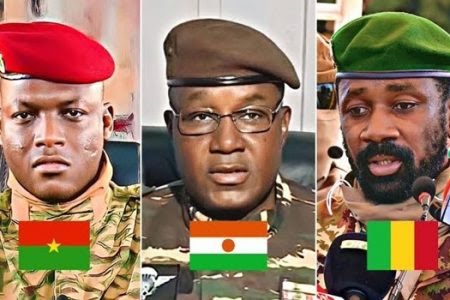A major crisis hit the 49-year old Economic Community of West African States (ECOWAS) yesterday.
Three member-countries-Burkina Faso, Mali and Niger-quit the sub-regional group, following protracted disagreement over its rejection of military rule in West Africa.
However, ECOWAS claimed that it was yet to get notification about the withdrawal announced by governments of the three countries.
The three Sahel nations said in a joint statement on state televisions that they had made a “sovereign decision” to leave ECOWAS “without delay”.
The juntas said they have “decided in complete sovereignty on the immediate withdrawal of Burkina Faso, Mali and Niger from the ECOWAS,” alleging that the bloc has “moved away from the ideals of its founding fathers and pan-Africanism” after nearly 50 years of its establishment.
The statement added: “Furthermore, ECOWAS, under the influence of foreign powers, betraying its founding principles, has become a threat to its member states and its populations whose happiness it is supposed to ensure.”
Struggling with jihadist violence and poverty, relations between the regimes and ECOWAS have been ruptured, following the coups took place in Niger last July, Burkina Faso in 2022 and Mali in 2020.
The three countries were suspended from ECOWAS, with Niger and Mali facing heavy sanctions.
They have hardened their positions in recent months and joined forces in an “Alliance of Sahel States”.
The French military withdrawal from the Sahel – the region along the Sahara desert across Africa – has heightened concerns over the conflicts spreading southward to Gulf of Guinea states – Ghana, Togo, Benin and Ivory Coast.
The prime minister appointed by Niger’s military regime, Ali Zeine, Thursday blasted ECOWAS for “bad faith” after the bloc largely shunned a planned meeting in Niamey.
Niger had hoped for an opportunity to talk through differences with fellow states of ECOWAS which has cold-shouldered Niamey, imposing heavy economic and financial sanctions, following the military coup that overthrew elected president Mohamed Bazoum.
The bloc, in a statement yesterday, said it was yet to get any official or direct notification from the three countries.
The statement reads: “The attention of the Commission of the Economic Community of West African States (ECOWAS Commission) has been drawn to a statement broadcast on the National Televisions of Mali and Niger announcing the decision of Burkina Faso, Mali and Niger to withdraw from ECOWAS.
“The ECOWAS Commission is yet to receive any direct formal notification from the three member states about their intention to withdraw from the community.
“The ECOWAS Commission, as directed by the Authority of Heads of State and Government, has been working assiduously with these countries for the restoration of constitutional order. Burkina Faso, Niger, and Mali remain important members of the community and the authority remains committed to finding a negotiated solution to the political impasse.
“The ECOWAS Commission remains seized with the development and shall make further pronouncements as the situation evolves.”
Reactions by international relations expects have trailed the exit of Burkina Faso, Mali and Niger from the Economic Community of West African States (ECOWAS).
They urged the regional body to employ persuasive diplomacy to bring them back into the fold.
The experts said in ECOWAS, like other international organisations, individual countries can decide to join or leave, depending on the interests they are pursuing.
They said other ECOWAS member-states should find a way of discussing with the countries and bringing them back on board through dialogue.
According to those who spoke, the affected countries are sending a signal, adding that “they will be the one who will later want to seek readmission”.
An Associate Professor and the Acting Director of Research and Studies Department at the Nigerian Institute of International Affairs (NIIA), Efem Ubi, said he asserted in a recent paper at the Institute of Security Studies in South Africa that if ECOWAS intervened militarily in any of the three countries, it would be its end.
He said in a situation of military intervention in any of the countries, they would align together and separate themselves from ECOWAS.
“With the announcement of this new alliance, can we say ECOWAS is still in existence? This is just the beginning of what we are expecting to see. Now, they have moved away; they have formed an alliance. I don’t know what you are still going to call the other remaining 12 ECOWAS members.
“I think the issue of military coups has not been handled rightly by the bloc,” Ibim said.
He said the sanctions placed by ECOWAS on the three countries only affect the citizens and not the coup plotters.
“ECOWAS has to look at the root causes of the problem of coups in West Africa. I have said it on many occasions that root causes of military take over have not been addressed.





Discussion about this post